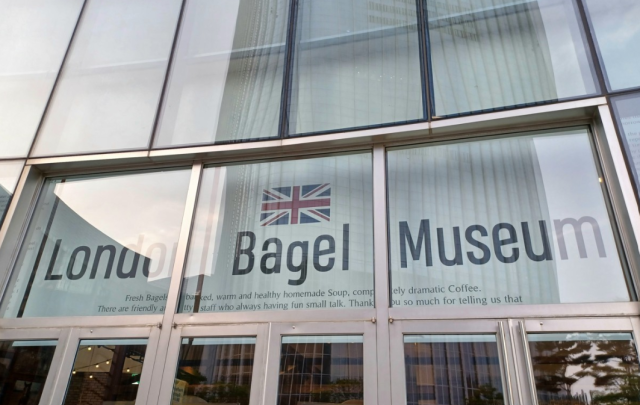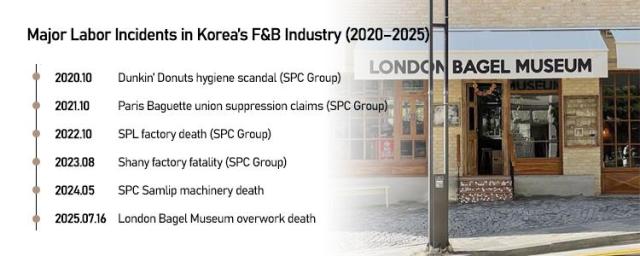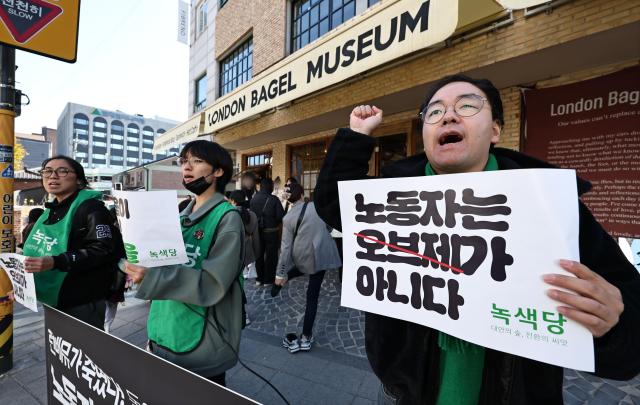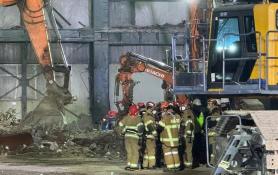
SEOUL, November 14 (AJP) - On most mornings, the line outside London Bagel Museum used to stretch down the block, a testament to the artisanal bakery chain’s grip on South Korea’s cafe-obsessed culture. Now the street is quiet, its pause in foot traffic reflecting a deeper national unease.
The sudden death of a 26-year-old employee at the chain has ignited a furious backlash over long-standing labor abuses in the country’s food and beverage sector, where exacting hours, precarious contracts and relentless customer demand have long been treated as the price of success.
According to data released by the National Assembly, London Bagel Museum recorded 63 industrial accidents approved for state compensation between 2022 and September 2025 — more than far larger food conglomerates such as SPC Samlip. Labor authorities have begun expanding inspections across the chain’s affiliates, citing evidence of repeated violations.
The victim, a young worker at one of the brand’s busiest locations, had reportedly logged up to 80 hours in the week before he died, with months of 58-hour averages preceding it.
The company has denied wrongdoing, attributing discrepancies to “attendance system errors,” while declining to hand over full timecard records to investigators.
Employees say the problem runs deeper. Workers have described signing one-month “split contracts” designed to evade overtime obligations and being ordered to publicly read written apologies during morning meetings for small mistakes — a form of humiliation management that labor organizers say is common in the franchise sector.
The scandal has revived memories of earlier tragedies. In 2022, a young worker was killed in a mixing machine at an SPC Group factory, prompting promises of sweeping reforms and a pledge to spend 1 trillion won ($730 million) on safety upgrades. Another worker died less than a year later. Watchdog groups note that only 0.3 percent of the promised funds appear to have gone toward hiring safety personnel.
Behind the recurring crises is a structural problem, experts say: the nation’s labor protections were designed for mid- and large-sized companies, not for the patchwork of tiny franchise units that dominate the booming F&B landscape.

“The core problem is that Korea’s labor law focuses on regular employees in larger firms, while most franchises operate with fewer than five workers,” said Lee Joo-hee, a sociology professor at Ewha Womans University. “These workers — often young and temporary — end up excluded from even basic protections like limits on working hours.”
Government data show F&B employees work an average of 50.2 hours a week, the highest of any service industry. More than one-third are part-time or irregular workers. Yet the domestic bakery market has continued to swell, reaching 8.4 trillion won ($6.3 billion) last year, fueled by demand for premium brands like London Bagel Museum and SPC’s La Granus.
Labor activists say that unless the government addresses the proliferation of subcontracting, unstable employment arrangements and enforcement gaps, the tragedies will only continue. The Labor Ministry is now reviewing new regulations that would mandate direct employment and full disclosure of work-hour data across the industry.
For now, the crowds have thinned, and the country’s most sought-after bagel shop has become an unsettling symbol of a deeper crisis. What once looked like a booming culinary success story is now a stark reminder of the workers who kept it running — and the system that failed them.

Copyright ⓒ Aju Press All rights reserved.




